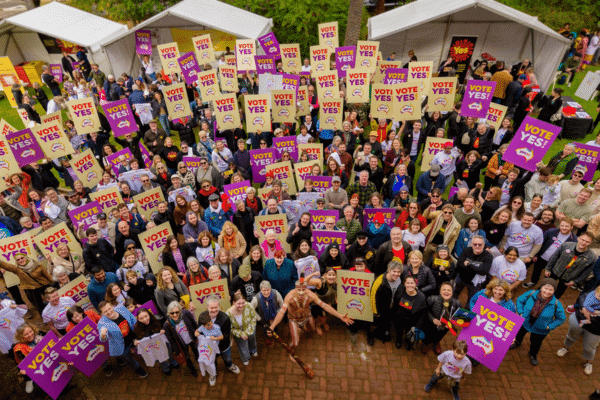As a Sikh Australian, I wholly back the moral stance in support of Indigenous constitutional recognition.
Travelling through Australia, this land of opportunities, I have been plagued by two questions.
First, how can it be that the country that provided prosperity and happiness for my family and myself, has done so little for the many Indigenous Australians living here for so long?
Second, how can it be that the Australian polity, despite their initial reluctance, eventually accepted me as a Sikh man with a turban, but has not yet formally accepted and included Indigenous peoples?
As a Singaporean-born Sikh Australian and President of the National Sikh Council of Australia, I wholeheartedly support the upcoming referendum on a constitutionally guaranteed Indigenous Voice and call on politicians across the political spectrum to do the same. Many Sikh Australians, and migrants more broadly, have immense empathy for the plight of Indigenous peoples. We want to see them properly recognised in the Constitution and guaranteed a fairer Voice in laws and policies made about them. That is why the Sikh Council, together with eight other major faith organisations, signed a joint resolution last year, and joint letter to politicians in February, calling for bipartisan support for the referendum.
I also contributed an essay to the new book, Statements from the Soul, explaining why I support this cause.
I arrived in Australia at the mature age of 38, with my wife and two-year-old son. I saw Australia as one of the best places to live in the world. My research told me this was a stable, fair, egalitarian, and democratic society with countless economic and non-economic opportunities. My research proved correct. I moved from Malaysia to Australia in 1981 and worked as a teacher to build a better life for me and my family.
I feel lucky and blessed to be Australian.
Living across various Australian jurisdictions, I interacted with Indigenous communities in Western Australia, Northern Territory and New South Wales. I experienced firsthand the warmth and affability of Australia’s First Peoples and learned about the deep historical connections between Indigenous Australians and Sikh (and Muslim, Hindu, and Afghan) cameleers.
Mutual connections between our communities have grown since the 1800s. I heard the personal recollections of Indigenous elders, who described the similarities between our two communities’ spiritual and psychosocial perspectives, and I grew to feel that Indigenous Australians and Sikh Australians had a sense of shared nationhood.
I have also seen the harsh realities faced by Indigenous communities, especially in remote areas.
Sikh Australians have tried to help where we can. Tejinder Pal Singh, a taxi driver in Darwin, was recognised as an Australian of the Year for his generosity cooking and delivering Indian food to disadvantaged Indigenous communities. Such kindness is inspiring and speaks to the solidarity many migrants feel with Indigenous communities.
Yet the need for this charity also demonstrates long term systemic failures of policymaking in Indigenous affairs.
The call for a Voice is morally justified and practically necessary. The least Australians can do for our fellow Indigenous Australians is to guarantee them an advisory say in laws and policies made about them.
There is no veto proposed. It is a modest and small ask, given the history of discrimination and injustice, and given current policy ineptitude and failure. Current arguments around reiterations of the proposed constitutional drafting are of limited value and threaten to dilute or side-track the impact of this reform. That needs to stop.
We must work together to deliver this for Indigenous communities and the nation.
As Sikhs, we are inspired by the teachings of the Guru Granth Sahib, of seva (service to humanity) and vand chakna (sharing and caring). This is why I feel a moral imperative to assist Indigenous Australians to take their rightful place in this country, which has given my family and me so much, but which was premised on their dispossession.
As multicultural Australians, this is our chance to give back. I say to the politicians withholding support for Indigenous peoples’ modest request to have a guaranteed Voice in their own affairs: Sikh Australians are watching. Migrants, multifaith and multicultural communities are watching. We are watching and we will vote.
Ajmer Singh Gill is president of the National Sikh Council of Australia and a contributor to Statements from the Soul: the moral case for the Uluru Statement from the Heart (La Trobe University Press).
Find out more about how the National Sikh Council of Australia and other multicultural organisations are supporting the Voice on multiculturalforvoice.org.
READ ALSO: This Indian Independence Day, reflect on the Voice




